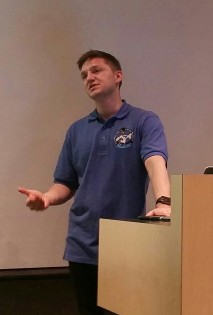Mars Exploration Worth it Argues Physicist
Prince George, B.C. – As far as lectures go, one could argue this one was really ‘out there.’
It took place at UNBC yesterday and was delivered by Dr. Ross Lockwood, a physicist with a Ph.D in condensed matter physics.
The talk was entitled ‘Everyday Astronaut,’ and it described some of the adventures he’s had with NASA funded studies including his participation in a 120-day long mission of the HI-SEAS Mars simulation in 2014.
As one might guess, he’s very passionate about Mars exploration.

Dr. Ross Lockwood during his talk at the Weldwood Lecture Theatre Wednesday – photo 250News
“Sure, I’m taking a more pragmatic approach than most people though,” he said. “So a group like Mars One, they would do it in the 2020s but I’m not behind that kind of concept. I’m more in favour of NASA who have more rigorous plans for the 2030s. I’m definitely on top of what they’re doing.”
Lockwood argued Mars travel is important for a couple of reasons.
“First and foremost, right now we’ve got all our eggs in one basket. Every human being is now living on Earth and we need to ensure the survival of our species and life as we know it by traveling to a different world and colonizing it,” he says.
“But for me, the question that really motivates me for travel to Mars specifically is knowing how life developed in the Solar System.”
He said part of the intrigue is the possibility that life could have actually started on Mars, not Earth.
“Mars was a wet planet a billion years before Earth was so it could be that that initial spark of life started there and through asteroid collisions transferred to Earth and then continued development here.”
Lockwood said it’s a question a lot of scientists want to answer and explains why they’ve sent things like Rovers to “probe the Martian soil.”
“So I’m hoping that within the next 10 years we can actually start to answer that question.”
But his goal heading into yesterday’s lecture was slightly less ambitious.
“Primarily what I’m looking for is undergraduates that become more engaged with programming that is available to them across the country,” said Lockwood.
“Signing up for medical studies like the one’s I’ve participated in and actually going and doing those experiences. I’m really pushing the idea that you don’t need to be someone with a Ph.D in physics in order to actually experience some of these studies.”

Comments
Trading one gravity well for another gravity well is not a viable survival strategy . The ISS is a perfect example as to why . If the ISS is on a collision coarse , they change its coarse . That option is not avalible for planets . Besides there’s that little matter of Mars not having a magnetosphere. The only benefit in Mars exploration that I see is the technological gains being made . That alone makes it worth while .
Comments for this article are closed.